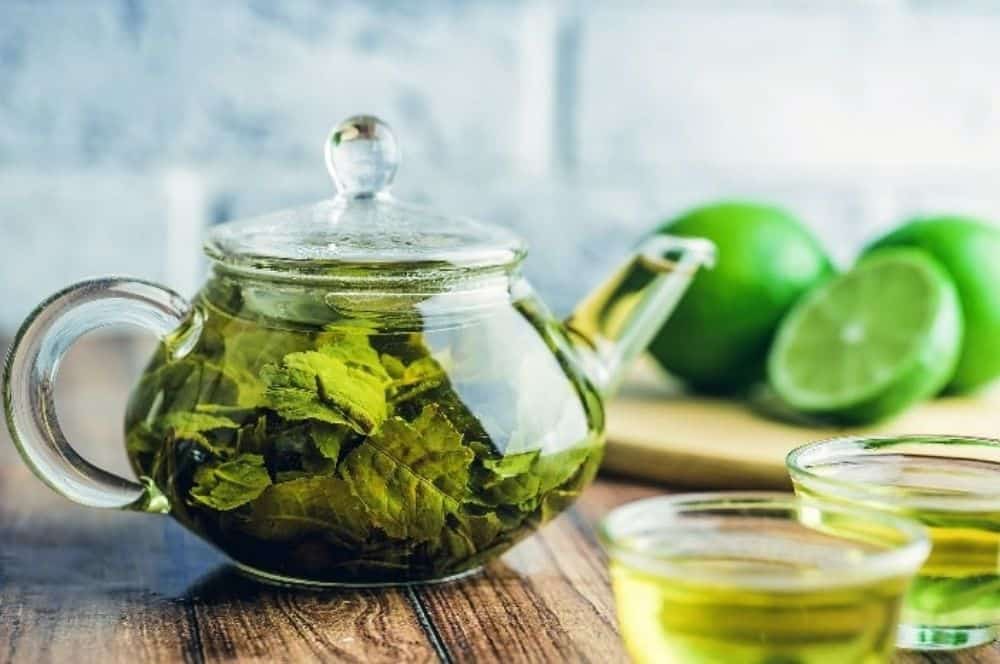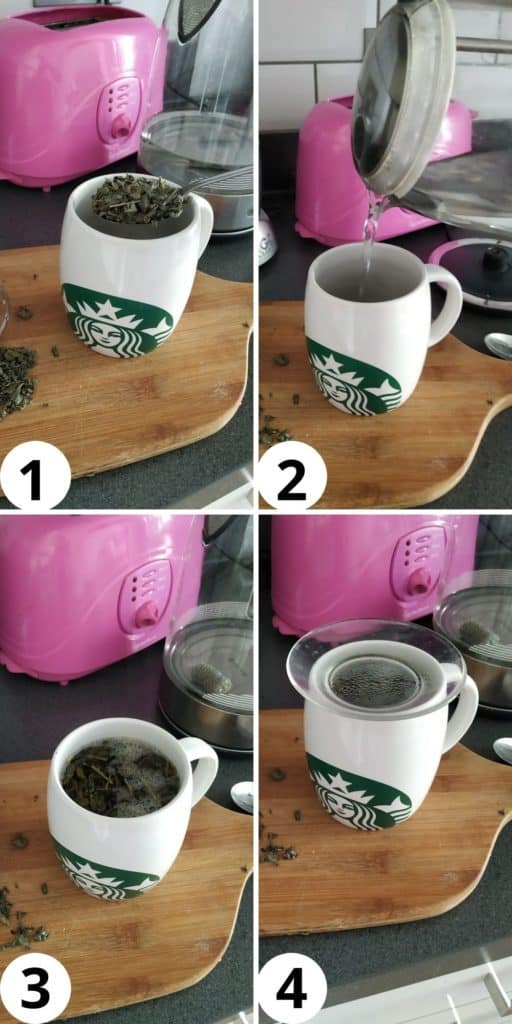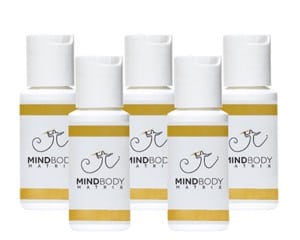
Many people turn to green tea because of its antioxidants and low caffeine levels. It’s a great option for black tea and coffee.
While first-timers may not like the taste of their first cups, some preparation methods can be the culprit of bitter undesirable taste.
But for people who have made a cup of green tea or two a part of their daily routine, there’s nothing compared to the soothing effects of sweet grasses, toast, nutty, and seaweed-taste of properly brewed green tea.
This mood-enhancing drink attracted more researchers to conduct studies of its composition because of its rumored multiple benefits.
There are claims it helps in burning fat, fighting cancer cells, and many more.
So if you’re considering green tea, let’s take a sip and see if green tea is good for you.
What Are the Nutrients Found In Green Tea?
People from Asia have been using green tea for thousands of years. They use it as medicine to relieve them from depression.
They also use it for headaches. But before we get into the list of what it does to the body, we need to know its nutritional composition to understand its benefits.
Green Tea Has More Vitamins Than You Think
It has Vitamins A, C, D, E, H, K, B2, and B6. The beta-carotene in green tea supplies Vitamin A for the skin and eyes. A 100ml of sencha, a variation of green tea, has 5ml of Vitamin C.
Green Tea Also Contains Minerals
In large amounts, it contains Magnesium, Potassium, Calcium, and Phosphorus. In small amounts, you’ll find Zinc, Iron, Copper, and Manganese.
Green Tea Contains Catechin, the Epigallocatechin-3-gallate (EGCG)
The active ingredient and natural antioxidant found in green tea are EGCG. The plant-based compound has so many benefits and plays a major role in green tea’s efficacy.
It is responsible for its medicinal effects and is healthy for both the heart and brain.
Green Tea Has Small Caffeine Content
All types of tea have caffeine. Caffeine is a mental stimulant. However, the excessive dosage can cause anxiety and affect your sleep.
Compared to coffee, green tea has only 30 to 50 mg of caffeine per 8 oz. For an 8 oz. cup, this is the caffeine content for coffee:
- up to 173 mg of caffeine of instant coffee
- up to 200 mg of caffeine of brewed coffee
- up to 720 mg of caffeine of Espresso
L-theanine In Green Tea Keeps One Cool and Chill
It works together with caffeine to boost mental focus and alertness without leaving a drowsy feeling.
Meaning, it balances the effects of caffeine by keeping the alert and focus yet calm at the same time.
And even with the stimulating effects of caffeine in green tea, it doesn’t aid in sleep deprivation.
What Are the Various Forms Of Green Tea?
Green tea comes in different forms before being served in a cup. It can come in a teabag, loose leaves, liquid concentrate, powder, tablets, or capsules.
But if you want to utilize the full benefits of green tea and consume it with its umami flavor, go with the loose leaves form. Minimally processed green tea retains most of its nutrients.
What Are the Benefits Of Green Tea?
So, is green tea good for you? Let’s look at how it helps.
1. It Keeps the Mind Alert
Green tea is abundant in stimulants, caffeine, and L-theanine. These two substances work together to improve brain function and response.
Both of them help in brain-boosting neurotransmitters, while the L-theanine maintains calm and reduces stress and anxiety.
2. It Keeps the Heart Healthy
Green tea controls LDL levels or bad cholesterol. The antioxidant compounds protect the LDL particles from oxidation. It improves the blood flow keeping blood vessels functioning and healthy.
3. Antioxidants Present In Green Tea Protect Against Inflammation
The antioxidants, EGCG, present in green tea, helps in preventing oxidative damage. Oxidative damage leads to chronic inflammation.
Chronic inflammation leads to many types of cancer.
These antioxidants balance the damaging effects of free radicals that potentially damage cells.
4. Green Tea Reduces the Risk Of Having Diabetes
Studies show how green tea helps in reducing blood sugar levels. It only means that drinking green tea can help you prevent acquiring type 2 diabetes, which happens when there is too much blood sugar in the body.
5. It Keeps the Brain From Aging
The bioactive compounds, like ECGC and L-theanine in green tea, keep the memory sharp. Green tea helps the brain remain active.
It also provides protection against brain aging, reducing the risks of acquiring dementia, Alzheimer’s disease, and Parkinson’s disease.
6. Green Tea Improves Oral Health
The catechin in green tea controls the growth of bacteria in the mouth. With fewer bacteria, it prevents mouth infections, improving oral health.
7. It May Increase a Person’s Life Span
You can live longer just by drinking green tea regularly. The studies of thousands of Japanese within 11 years show that those who drank a cup of green tea about five times a day tend to have a lower mortality rate.
8. Green Tea Promotes Healthier Teeth and Strong Bones
Green tea is rich in minerals like Fluoride and Calcium. Fluoride prevents bacteria from damaging the teeth. Calcium makes the body strong.
Disadvantages Of Drinking Green Tea
While there are so many benefits of drinking green tea, the disadvantages of drinking it may slightly come from its caffeine content.
Taking green tea in excessive amounts can lead to side effects caused by caffeine:
- Upset stomach
- Headache
- Palpitations
- Diarrhea
- Muscle contractions and pulsations
But when taken in small amounts, you can avoid these effects. So to make sure that green tea is good for you, take the optimal dosage of green tea per day, which should not exceed five cups daily.
Another disadvantage is it can reduce the body’s iron absorption. Catechins, when taken in large amounts, may induce iron deficiency and anemia.
Catechins can also interfere with the effects of existing medications. The best thing you can do is learn the best way to consume green tea and ensure that you are taking only enough green tea daily.
How To Make Green Tea – best way to drink green tea
I absolutely love drinking green tea for the focus it gives me when I need to concentrate on particular piece of work, for calming effect it has on me and for the powerful antioxidants it gives to my body to support my immune system 🙂
Over the years I have developed the perfect brewing method that always works for me to achieve just that.
What’s the secret? In order to get the ‘kick’ from my green tea I brew the loose leaf green tea for about 30min in a thick porcelain mug (thick glass is fine too) and put a saucer on the top of my mug.
I know the tea is ready to drink when the mug is very warm to the touch but not burning hot. The tea should be still hottish to drink (not lukewarm).
Over the years I noticed it’s about 30min since I poured the water over.
What else? I use relatively a bigger mug for brewing my green tea as once the tea is brewed, the tea leaves will take up about a quarter of the mug.
Also, you need a mug made with thick material (ideally natural material/source like porcelain or glass) so your tea doesn’t cool down during the brewing process which takes about 30min.
Your tea should be still hot to drink (ready to drink just as you would have any other hot drink) once the brewing is done. And ‘thicker mug’ enables that.
Brewing Green Tea – Step by Step

The above picture breaks down steps 1-2 in the below process
- Place about 1 full tablespoon of loose green tea in a thick porcelain/glass mug (use bigger mug e.g. 400ml as above)
2. Pour boiling water over and cover the mug with a saucer
3. Wait about 30min (I now just wait for the mug to be very warm but not as hot to the touch that it is burning my hands. Don’t worry-this comes with a bit of practice)
4. Remove the saucer and a possible few small hard bits in the tea that may have came to the surface
Your green tea is ready to drink now!
Pro Tip: Green tea has a cooling effect on the body (really!) so if you drink it in the winter time (if you don’t live in warm climate zone) or like myself you are simply prone to sore throats, it is best to add some warming spice in eg ginger powder, cardamom or better yet a few slices of fresh ginger.
Because the green tea made this way is truly powerful in terms of energy and focus I get from it (aka ‘the kick’), I only have one mug of green tea a day and it is enough for me.
What Is the Best Time Of the Day To Have a Green Tea?
There probably isn’t a good or bad answer here. If you ask me, it is definitely the afternoon (not evening though). Why?
I feel this is the time I normally need to focus on my work and need that extra concentration power.
Secondly, I never have the brewed green tea in the morning or on empty stomach as it is strong and since I don’t eat much first thing in the morning, it would have made me feel a bit nauseous with hunger.
I feel like green tea helps digest the food hence having it about 2hr after my main meal of the day, works just perfect (it is my personal experience though).
I personally also avoid having my brewed green tea after 6pm as it is very energetic and may cause sleeping difficulty, if drunk too late.
Is Green Tea Good For You: Final Word
Green tea is a proven powerful and natural antioxidant with a number of health benefits linked to its properties.
However, if you are sensitive to caffeine, you should be cautious before attempting to drink it and better yet consult your medical practitioner, if in any doubt.

Related Posts:
Antioxidants Benefits – What Are Antioxidants Good for?
18 Foods That Boost Immune System Naturally
What Powders To Add To Smoothies For Energy and Focus? 5 Best Natural Supplements To Try!







This is awesome. You have shared the information so clearly and precisely. I am quite convinced to take up drinking green tea regularly in the afternoon in the manner in which you have described! Thankyou!!!
Thank you so much for your feedback! Happy to hear I could help!